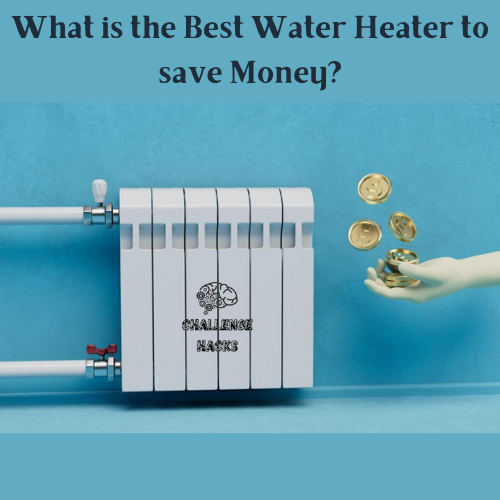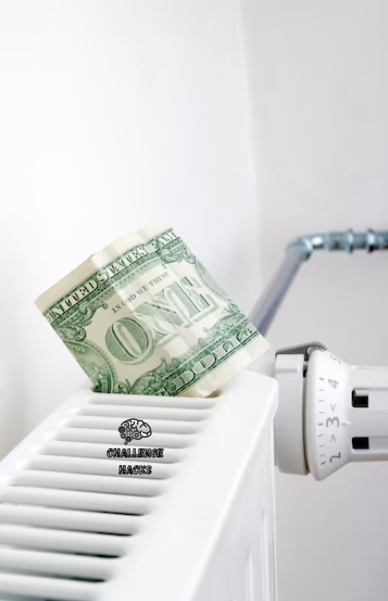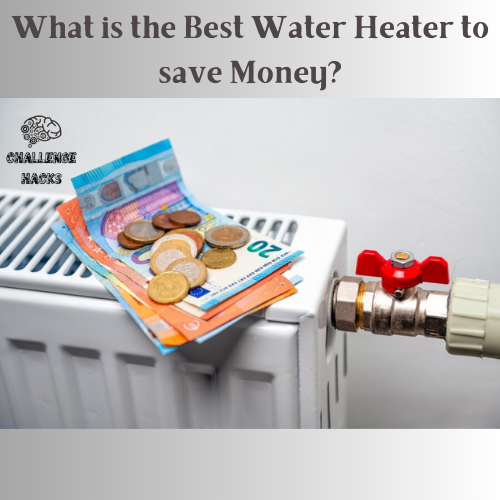
At 20% of total energy use, water heating is one of the main energy costs for most families. Consequently, the environmental effect and monthly utility costs you pay can be greatly impacted by your choice of water heater. Choosing the best water heater to save money for your needs can be challenging since there are numerous models and varieties to choose from. We will weigh the benefits and drawbacks of several types of water heaters in this post, along with some advice on how to select the best water heater to save money.
Types of Water Heaters
Water heaters come in three primary varieties: hybrid, tankless, and storage tank models. Depending on your home’s size, fuel preference, hot water consumption, and financial constraints, each model offers pros and cons.
Storage Tank Water Heaters
The most prevalent kind of water heaters in the US are storage tank models. They are made up of a sizable, insulated tank that can hold between thirty and eighty gallons of water. Until it is needed, the water is heated to a steady temperature using an electric element or gas burner. When a hot water faucet is turned on, heated cold water replaces the hot water that was previously in the tank. When demand is high or recovery time is slow, storage tank water heaters may run out of hot water due to their limited supply.
Tankless Water Heaters
On-demand or immediate water heaters also referred to as tankless water heaters, do not hold water in reserve. Rather, they immediately heat the water as it flows through a sequence of heat exchangers or coils. The water heater detects the flow when you turn on a hot water faucet and turn on the heating element. Nearly instantaneously heated, the water is sent to the faucet at a steady temperature. As long as the flow rate remains within the unit’s capacity, tankless water heaters offer an infinite supply of hot water. They might not be able to manage several simultaneous hot water needs, such as doing the dishes and taking a shower at the same time, though.
Hybrid Water Heaters
Heat pump water heaters, commonly referred to as hybrid water heaters, transfer heat via electricity rather than producing heat straight away. Heat is taken from the surrounding air and transferred to the water in a storage tank, much like a refrigerator operating in reverse. Though they need a specific amount of space and ambient temperature to function properly, hybrid water heaters are more energy-efficient than traditional electric water heaters. In addition, if the heat pump is unable to supply enough hot water, a backup electric heating element will activate.
Factors to Consider When Choosing a Water Heater
Fuel Type:
The choice of fuel for your water heater—electricity, natural gas, propane, or solar—significantly impacts its efficiency and operational expenses. It’s crucial to factor in the availability and cost of your preferred fuel type based on your specific location and circumstances. This consideration ensures not only optimal performance but also cost-effectiveness in the long run.
Size and Capacity:
Selecting a water heater with the right tank size or flow rate is essential to cater to your household’s hot water requirements effectively. Assess factors like the number of individuals in your home and identify peak hot water usage periods to ensure the chosen water heater meets these demands efficiently. This thoughtful consideration ensures a seamless and satisfying hot water experience tailored to your specific household needs.
Energy Efficiency:
Prioritize water heaters boasting a high Energy Factor (EF) rating to guarantee optimal energy efficiency. Opting for energy-efficient models not only contributes to lower utility bills but also aligns with sustainable practices, reducing your overall environmental impact. This conscientious choice not only benefits your finances but also aligns with eco-friendly efforts, making it a wise and responsible investment for your home.
Cost and Installation:
Carefully weigh the upfront and installation costs against the long-term savings and overall value when selecting a water heater. Finding this balance ensures a decision aligned with immediate budget constraints and future financial goals.

Best Water Heater to Save Money:
Best Overall: A.O. Smith Signature 50-Gallon Natural Gas Heater
This water heater stands out primarily for its exceptional dependability and performance. Its large 50-gallon capacity makes it ideal for various domestic requirements and guarantees a steady and ample hot water supply. (Best Water Heater to Save Money)
Best Bang For The Buck: Rheem Performance Platinum 50-Gallon Water Heater
Renowned for delivering outstanding value at an affordable price point, this water heater seamlessly blends quality and cost-effectiveness. With a generous 50-gallon capacity, it caters to a range of household hot water requirements. (Best Water Heater to Save Money)
Best Tankless Electric: Stiebel Eltron Tankless Electric Water Heater
Energy efficiency and instantaneous hot water are two advantages of using a tankless electric water heater. Reliability and cutting-edge energy-saving features set Stiebel Eltron apart as a prominent brand in this area. For anyone seeking to improve their home’s energy efficiency and enjoy the comfort of on-demand hot water, Stiebel Eltron tankless electric water heaters are a dependable option because of their dedication to delivering a steady and effective hot water supply.
Rinnai High-Efficiency Natural Gas Water Heater is the best tankless gas heater
Embracing the efficiency and continuous hot water supply of tankless gas water heaters is a wise choice, and Rinnai’s high-efficiency model stands out for its impressive performance and energy-saving capabilities. (Best Water Heater to Save Money) Recognized for innovation in water heating technology, Rinnai ensures a reliable and energy-efficient solution for households seeking on-demand hot water without compromising on performance.
Best Energy-Efficient: Rheem Performance Platinum Hybrid Electric Heater
When it comes to water heating, hybrid electric water heaters seamlessly combine versatility with efficiency, and Rheem’s Performance Platinum model shines with its cutting-edge features and outstanding energy-saving capabilities. This inventive solution stands out as a preferred choice for individuals looking to enhance their water heating experience, delivering a well-rounded equilibrium between performance, energy efficiency, and technological advancements.
Positives and Negatives of Different Types of Water Heaters

| Water Heater Type | Pros | Cons |
|---|---|---|
| Storage Tank Gas | – Cheap and easy to install – Fast and reliable hot water delivery | – Low energy efficiency and high operating costs – Limited hot water supply and slow recovery time – High standby heat loss and greenhouse gas emissions – Short lifespan and high maintenance costs – Safety and venting issues |
| Storage Tank Electric | – Safe and easy to install – Reliable and consistent hot water delivery | – High operating costs and low energy efficiency – Limited hot water supply and slow recovery time – High standby heat loss and electricity consumption – Short lifespan and high maintenance costs |
| Tankless Gas | – High energy efficiency and low operating costs – Endless hot water supply and fast recovery time – Low standby heat loss and greenhouse gas emissions – Long lifespan and low maintenance costs | – Expensive and complex to install – Inconsistent and fluctuating hot water delivery – Limited hot water output and flow rate – Safety and venting issues |
| Tankless Electric | – High energy efficiency and low operating costs – Endless hot water supply and fast recovery time – Low standby heat loss and electricity consumption – Long lifespan and low maintenance costs – Safe and easy to install | – Expensive to purchase – Inconsistent and fluctuating hot water delivery – Limited hot water output and flow rate – High electricity demand and circuit requirements |
| Hybrid Electric | – Very high energy efficiency and low operating costs – Large hot water supply and fast recovery time – Low standby heat loss and electricity consumption – Long lifespan and low maintenance costs – Smart and programmable features | – Very expensive to purchase and install – Large and bulky size and weight – High noise level and vibration – Space and temperature requirements – Backup heating element issues |
| Solar | – Very low operating costs and high energy efficiency – Renewable and clean energy source – Low use of electricity and greenhouse gas emissions – Long lifespan and low maintenance costs – Tax credits, rebates, and incentives | – Very expensive to purchase and install – Limited and variable hot water supply and recovery time – High standby heat loss and backup system costs – Large and conspicuous size and appearance – Weather and location dependence |
How long do water heaters last?
The lifespan of a water heater depends on the type, model, quality, usage, and maintenance of the water heater. On average, a water heater can last from 8 to 15 years, with tankless and hybrid water heaters lasting longer than storage tank water heaters. To extend the lifespan of your water heater, you should follow the manufacturer’s instructions and recommendations, and perform regular inspections and maintenance, such as flushing the tank, replacing the anode rod, checking the valves and pipes, etc.
How often should I flush my water heater?
Cleaning out silt, minerals, and other materials that may build up at the bottom of the tank and compromise the water heater’s effectiveness is known as flushing. This is done by emptying and re-filling the tank. In case of hard water or high water usage, you should flush your water heater more frequently than once a year. Resolving noise issues, raising heating efficiency, extending water heater life, and improving water quality can all be achieved by flushing your water heater.
How can I save energy and money on water heating?
There are various methods to enhance energy efficiency and cut costs on water heating, including:
Choosing the appropriate water heater type, size, and fuel that aligns with your home and budget.
Adjusting the water heater temperature to 120°F or below, is sufficient for most household needs while preventing scalding and overheating.
Insulating the water heater tank and pipes to minimize heat loss, potentially saving up to 15% on energy expenses.
Installing low-flow showerheads and faucets to reduce water consumption, leading to potential savings of up to 60% on water heating costs.
Using cold water for laundry and dishwashing can result in savings of up to 90% on water heating costs.
Turning off the water heater when not in use or utilizing a timer or smart controller to schedule operation, potentially saves up to 20% on energy costs.
Replacing an outdated and inefficient water heater with a new, energy-efficient model can yield savings of up to 50% on energy costs and may qualify for tax credits, rebates, and incentives.
What symptoms might a faulty water heater show?
Some of the signs of a failing water heater are:
No hot water or not enough hot water
Water temperature fluctuations or inconsistencies
Water leaks or drips from the tank or pipes
Water discoloration or odor
Water heater noise or rumbling
Water heater corrosion or rust
Water heater age or wear and tear
If you notice any of these signs, you should contact a professional plumber or water heater technician to inspect, repair, or replace your water heater as soon as possible.
What is the best temperature setting for a water heater?
Determining the optimal temperature setting for a water heater involves considering personal preferences, comfort, and safety factors. While experts and manufacturers generally recommend a temperature of 120°F, which adequately meets most household needs and helps prevent scalding and overheating, adjustments may be necessary if your dishwasher requires a higher temperature. In such cases, using a booster or a sanitizing cycle, or setting the water heater temperature to 140°F (the maximum allowed by most codes and standards) may be appropriate. It’s important to note, however, that elevating the temperature may lead to increased energy consumption, a higher risk of burns, and the potential growth of bacteria, including Legionella, which is associated with a severe respiratory infection.
Y0U MAY LIKE THIS: 10 Ideas for Selecting the Best Water Heater for Your Home
Conclusion
In summary, selecting a water heater that meets your household needs and the Best Water Heater to Save Money involves careful consideration of factors like type, size, fuel, energy efficiency, and overall costs. Opting for the right model aligned with your preferences ensures a balance of performance and budget. Key takeaways:
- Types: Choose from storage tank, tankless, or hybrid options, each with unique advantages based on household size, hot water demand, and budget.
- Peak Demand: Match your peak hour demand with the flow rate of different models to find a unit that meets your hot water requirements.
- Efficiency: Prioritize energy-efficient models to reduce utility bills and environmental impact.
- Costs: Consider total ownership costs, including purchase, installation, and ongoing maintenance fees.
- Top Picks: Explore our curated selection of top-rated water heaters, balancing performance, efficiency, and cost-effectiveness.
- Energy Savings: Implement practices like temperature adjustment, insulation, low-flow fixtures, and smart controls to optimize energy use.
3 thoughts on “What is the Best Water Heater to save Money?”